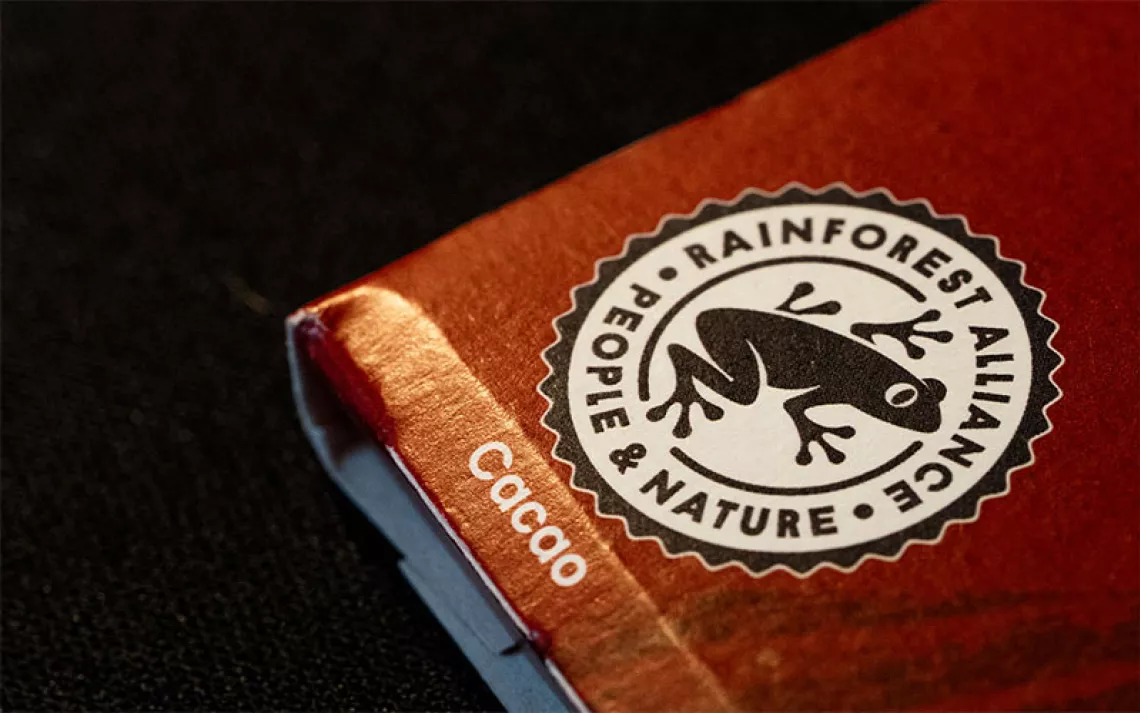Five *Truly* Green Beers to Toast This St. Paddy's Day
Find your pint of gold at the end of the rainbow
If you plan to raise a toast this March 17, it’s your lucky day. Pioneering breweries across the United States are putting the environment first, investing in equipment and employing practices that conserve water, curb energy use, reduce waste, and support their surrounding communities. By crafting eco-minded ales and lagers, these producers give us plenty to celebrate—sustainably, of course. Here’s a menu of green beers to reach for on St. Patrick's Day and throughout the year.
Brewery Vivant Farm Hand
St. Patrick's Day doubles as annual sustainability report release day at Brewery Vivant in Michigan ("It's our version of green beer," says the company website). That makes March 17 a great time to crack open a can of the flagship Farm Hand, an unfiltered, slightly sweet farmhouse ale that earned a 2018 Good Food Award. LEED Silver–certified since 2012, Brewery Vivant lightens its footprint and maximizes local economic impact by purchasing 50 percent of its food and 25 percent of its beer inputs from within Michigan. Solar panels generate 10 percent of the company’s electricity, while low-flow fixtures save 50,000 gallons of potable water a year. The Grand Rapids–based brewery, which distributes throughout Michigan and the greater Chicago region, also donates 1 percent of its sales to charitable organizations.
Sierra Nevada Stout
Ken Grossman launched Sierra Nevada Brewing Company 40 years ago, crafting five barrels of roasty, earthy stout on a system built from refurbished dairy equipment. Today, his commitment to innovation and sustainability continues to shape the company’s efforts. Sierra Nevada's North Carolina facility was the first American production brewery to earn LEED Platinum status, and it’s also a certified Audubon Cooperative Sanctuary. Open since 2015, it incorporates recovered timber building materials, rainwater catchment cisterns, organic gardens, bike-friendly amenities, recycling and composting programs with a 99.8 percent diversion rate, and a carbon dioxide recovery system that pressurizes tanks using CO2 captured from the fermentation process. More than 90 percent of the electricity powering Sierra Nevada's flagship California brewery comes from 10,750 solar panels and a two-megawatt microturbine system; waste heat from the turbines creates hot water that’s used to brew beer. The company also supported 19 trail cleanup projects during the American Hiking Society's 2019 National Trails Day, and its Take Back Our Trails campaign has generated cleanup pledges for another 3,911 trail miles nationwide.
Allagash White
Allagash White, an easy-drinking, Belgian-style wheat beer spiced with subtle Curaçao orange peel and coriander, is a repeat Great American Beer Festival winner that’s available in cans or bottles. It comes from Maine-based Allagash Brewing, a founding member of the Glass Recycling Coalition. Allagash directs wire cages from atop its 375-milliliter and 750-milliliter bottles into a special recycling process, and corks collected at the brewery are repurposed to make yoga blocks and footwear. Overall, the B Corp brewery diverts 99 percent of its waste and spent grain from landfills. Allagash also donates 10 cents from every barrel brewed to conservation efforts organized by Sebago Clean Waters and, as a founding Maine Brewshed Alliance member, advocates for thoughtful water policies. Next up for Allagash? Continued progress toward a goal of sourcing 1 million pounds of Maine-grown and processed grain by 2021.
HUB Ferocious Citrus IPA
"Good Beer Does Good," states a T-shirt available from Hopworks Urban Brewery (HUB). The Portland, Oregon–based B Corp takes that premise seriously, as a 1% For The Planet member business that sources organic ingredients and purchases hops from farms designated Salmon Safe by the Pacific Rivers Council. The bike-friendly brewery built its original location with reclaimed materials and efficient fixtures. Its follow-up outpost in north Portland is tucked into a net-zero-energy building, and the brewpub in Vancouver, Washington, fronts two major cycling paths. Pick up HUB's Ferocious Citrus IPA for a hazy mix of organic hops and wheat grown on San Juan Island, or look for the Long Root Pale Ale, brewed in partnership with Patagonia Provisions. It integrates kernza, a deep-rooted perennial grain studied for its carbon-sequestering capabilities.
North Coast Steller IPA
Pop the top on a crisp, pine-forward Steller IPA to celebrate while also supporting marine mammal research and rescue programs. Through a partnership with the Ocean Foundation, the California brewery donates money for each bottle or keg sold. (Thirsty for something more robust? North Coast's Brother Thelonious Belgian-style abbey ale funds Monterey Jazz Festival educational programs.) Under the umbrella of its One Pint at a Time sustainability initiative, the Fort Bragg–based company brews a year-round lineup of Non-GMO Project Verified beers and has earned B Corp certification for its social and environmental performance. North Coast also works with its 40-acre neighbor, Fortunate Farm, to source seasonal produce, turn spent grain into compost, and cultivate carbon farming programs.
 The Magazine of The Sierra Club
The Magazine of The Sierra Club




